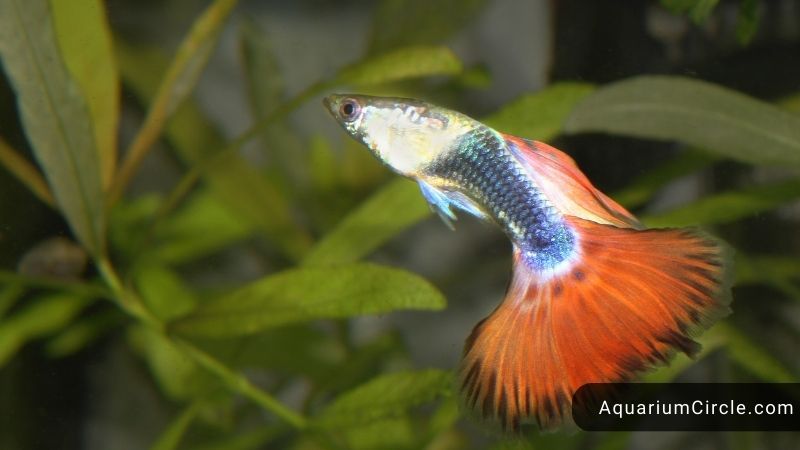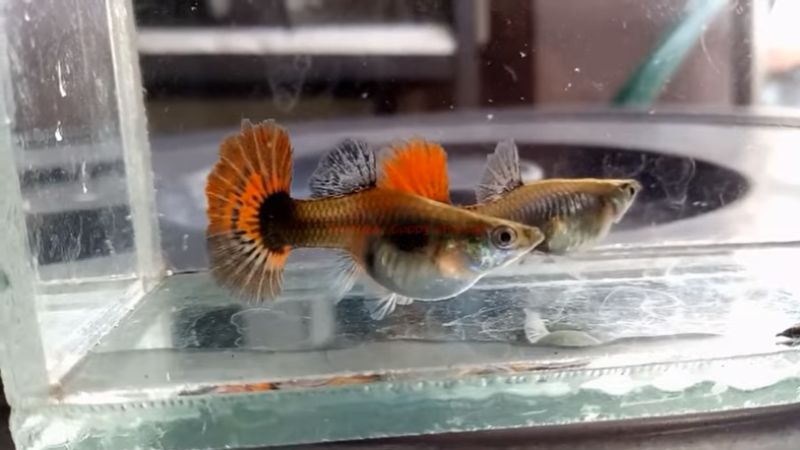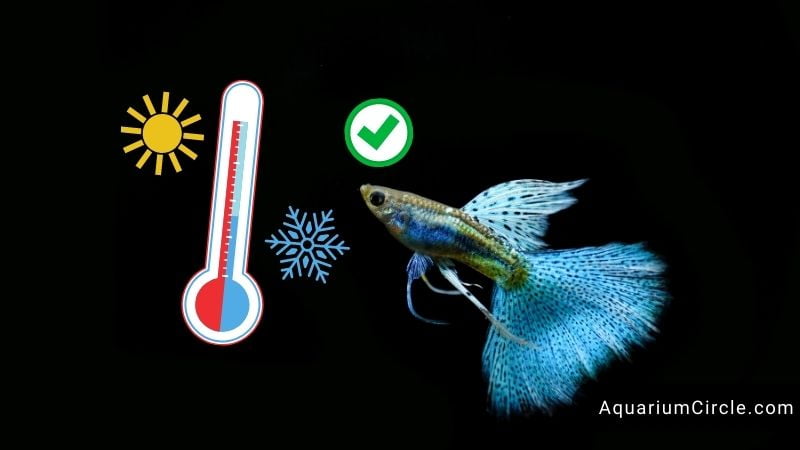One of the most common tropical fish to be seen in aquariums at home is guppies. As long as the aquarium’s water is the proper temperature for these tiny fish, they can live there. Guppies are fantastic since they are really laid-back. To learn more about guppy temperature, see this article.
What Is Ideal Guppy Temperature?
Guppies thrive in a tropical climate in the wild. The suitable temperature range for guppies is between 72°F to 82°F (22°C to 28°C). It’s important to maintain a consistent temperature in the aquarium, as sudden fluctuations can cause stress and illness in guppies. Guppies are tropical fish and prefer warmer water, but it’s important to avoid overheating the water as well. An ideal guppy water temperature is considered optimal, as it supports their metabolism and immune system and encourages healthy growth and breeding.
Your finger should feel warm when dipped into the aquarium’s water. But, for accuracy, we advise using a thermometer. Their vibrant bodies provide evidence that they require warm water to survive. Moreover, they grow quickly in warm climates.
What Is The Maximum Guppy Temperature?
Guppies can withstand temperatures up to 82 degrees Fahrenheit. These fish can endure temperatures as high as 90 degrees (32 degrees Celsius) even then. After the water reaches this maximum temperature, it can only stay in it for a brief period of time. The metabolism of a guppy accelerates once the water in its aquarium gets too hot. They get even more hyperactive as a result of this.
Also, even if you don’t expose your guppy to temperature variations for a long time, infections and parasites may still harm it. A stressed fish is more likely to die from illnesses because of the temperature. Because hot water can’t hold as much oxygen as cold water, fish breathe oxygen from the water. Because of this, it’s crucial to regularly check your thermometer to make sure that the water’s temperature stays within the permissible guppy water temperature range.
What Is The Minimum Guppy Temperature?
Guppies need to live in above minimum water temperature that is 60 degrees Fahrenheit (16°C). Guppies survive in cold water and can endure if temperatures dip that low. Cold water reduces their activity level, which leads to further problems. The problem with chilly tanks is that they might have difficulty reproducing or may stop reproducing completely. If you keep your guppies in a not right temperature, they feel the same way you would if you walked outside in the winter without a jacket.
When the water temperature change in nature, the fish can travel to warmer waters. Since you can’t do that in an aquarium, you must regulate the temperature in the proper range. Guppies can survive in aquarium water temperatures of 65 degrees for a short period. But they are more prone to catching infections in these water parameters.
How To Adjust The Best Guppy Temperature?
Keep a thermometer in your aquarium at all times so you can track the optimal temperature range. If the temperature in your guppy’s tank drops to cooler water of 74 degrees Fahrenheit, you must intervene to prevent the guppies from being unwell. To regulate the temperature in your aquarium, you’ll need a heater. Be sure to buy a heater of the proper size for your tank. If your heater does not have the appropriate wattage for your tank size, you may not heat the water sufficiently.
Keeping suitable guppy temperature when changing the water?

Excess nutrients are diluted by water changes to prevent hazy and poisonous water. To survive, guppy fish require a pristine habitat. You should make 25% weekly water changes because of this. Your fish tank’s temperature the water should be comparable to that of the freshwater. For instance, you should set the temperature of the freshwater between 74 and 77 degrees Fahrenheit if the tank water temperature is 75 degrees F.
Pay attention to the amount of chlorine in the freshwater as well. Let your tap water rest in an open container for 24 hours if it has chlorine traces so that the chlorine can evaporate.
Do guppy fish need a heater?
The water heats up more slowly, unlike air, so yes, guppies need a water heater. Aquarium heaters create the right temperature of water in your tank to keep your fish healthy. As mentioned above, guppies need warmer water. If you live in a climate where the outdoor temperature drops under 68 °F (20 °C) in the winter, most likely, you will need an aquarium heater.
A heater for your fish tank is essential unless you live in a tropical environment. They cannot live in the frigid temperatures experienced in North America and the United Kingdom. You’ll need a heater to adjust the temperature for guppies if you want them to feel at ease. They will be in danger of various ailments if you do not maintain their water warm enough.
What Happens If The Water Temperature Too Hot Or Cold?
Too hot
Your fish tank may feel uncomfortable if the temperature inside your house is too high. Guppies cannot survive in waters that are hotter than 82 degrees. If the water temperature rises too high, your guppies might not be able to breathe. Turn on the thermostat-controlled heating and cooling system if there is one to keep the water at optimal temperature.
Too hot water can lead to many problems for your fish:
- Reduced oxygen levels: The oxygen level in water is lower the warmer it is. Guppies cannot thrive without air.
- Shorter life span: Guppies die if they don’t have access to breathing air. These fish can survive for two to three years when their ideal water temperature is maintained. Therefore, these deaths are untimely.
- Harmful bacterial or toxin: Your guppies may become stressed and ill because of the poisons and microorganisms. Also, your guppies could easily perish because of the unfavorable water temps.
If you notice that the water in your guppies is excessively hot, you can fix the problem by:

- Using a spray bar: By adding a spray bar to the filter, you can stir the water’s surface. Although warmer water has less oxygen, doing so will increase the level.
- Use an aquarium fan: In order to lower the water’s temperature, install an aquarium fan as well. Evaporation, however, will result from utilizing a fan. Consequently, keep in mind to monitor the water levels and add water as needed.
- Switch off aquarium lights: Certain aquarium lights generate heat, which can warm the water. Turning them off will allow the water to cool.
- Remove the lid: By doing this, you can let off stored heat and encourage the movement of chilly air. Therefore, if you have jumping fish in the guppy aquarium, take extra care.
Too cold
We all know how too warm water can affect the guppies. But how about the too-cold water temperature in the aquarium? Let’s see more right now.
- Less active (just like humans): In chilly climates, animals with cold blood are dormant. As cold-blooded fish, guppies require warmth to function. Your fish may become anxious and uncomfortable from inactivity, get ill, and even pass away.
- Prone to developing diseases: Despite being tough, cold water temperature increases your guppies’ susceptibility to illness. Warm water is better for these tropical fish than cold water. Your guppies could kill other fish in the aquarium if they spread an illness to them.
- Guppy breeding: Guppies require energy to reproduce. They become less energetic, sluggish, and lethargic in cold water. Their lack of energy prevents them from reproducing. Guppy fries also require warmer water to survive.
- Hard water: You know about the right water temperature for guppies. Most fish owners keep water and air heat differently, which can cause your fish to grow slowly for a longer lifespan.
FAQs
Can guppy fish live In an outside pond?
Yes. Guppies can benefit from a natural setting that supports their health and well-being by having access to outdoor ponds. To avoid the accumulation of hazardous toxins and waste, it’s crucial to make sure the pond is correctly set up with enough filtration, aeration, and upkeep. Moreover, guppies may be prey to predators in an outdoor pond, so it’s crucial to take precautions to safeguard them. Some of these precautions include providing hiding spots or utilizing netting to bar larger animals from accessing the pond.
What is the best time to keep guppies in warmer waters?
Only when providing treatments do we advise keeping guppies in warmer water? It has been noted that these fish respond better to treatment in water that is warmer. But, since warm water has little oxygen, only leave them in it there for a brief period of time because they can shock the fish by making things too hot.
Where should a guppy tank be?
The position of a guppy tank should be distant from heat sources like radiators and air conditioners, as well as direct sunshine. To prevent any spills or accidents, it’s also critical to pick a position that is sturdy and level. It’s crucial to pick a site that can be readily maintained and cleaned and that is free of pets or other creatures that could harm the guppies.
References:
- Guppy Expert – https://guppyexpert.com/guppies-maximum-water-temperature/
- Guppy Fish – https://en.wikipedia.org/wiki/Guppy

Annette M. Chaney is an experienced marine biologist with over 20 years of experience as an aquarist and fishkeeper. She started her first aquarium at a young age, filling it with frogs and goldfish obtained from the ten-cent pet store.
Annette grew up caring for and breeding African Cichlids, which led to a hobby in high school that doubled as a profitable means. Attending Reed College gave her time to solidify herself as an accomplished aquarium caretaker with an eye for sales. After that, from 2009 – 2013, she studied at Roger Williams University – one of the most prestigious universities for Aquaculture and Aquarium in USA. She is the founder of AquariumCircle since 2010.
